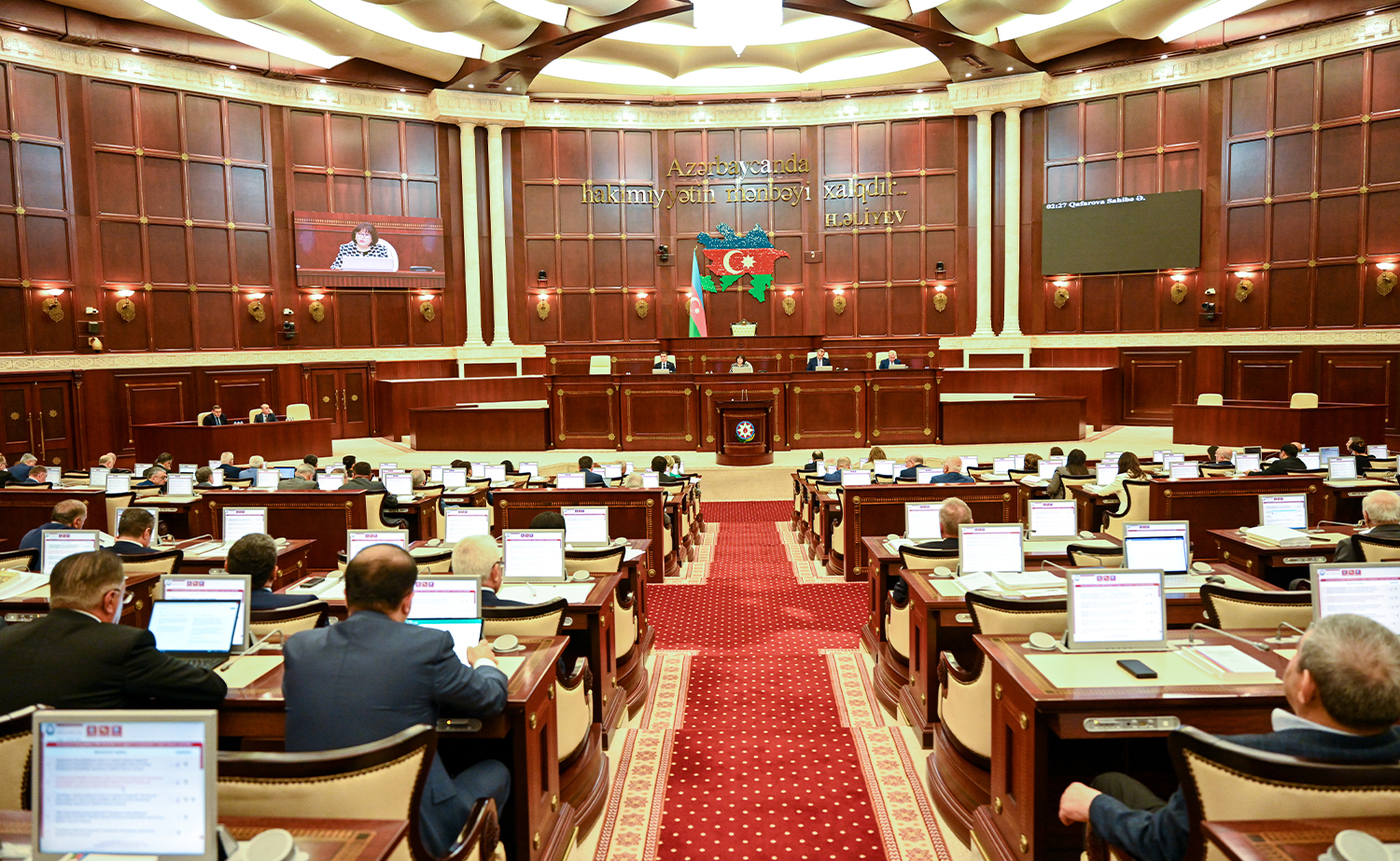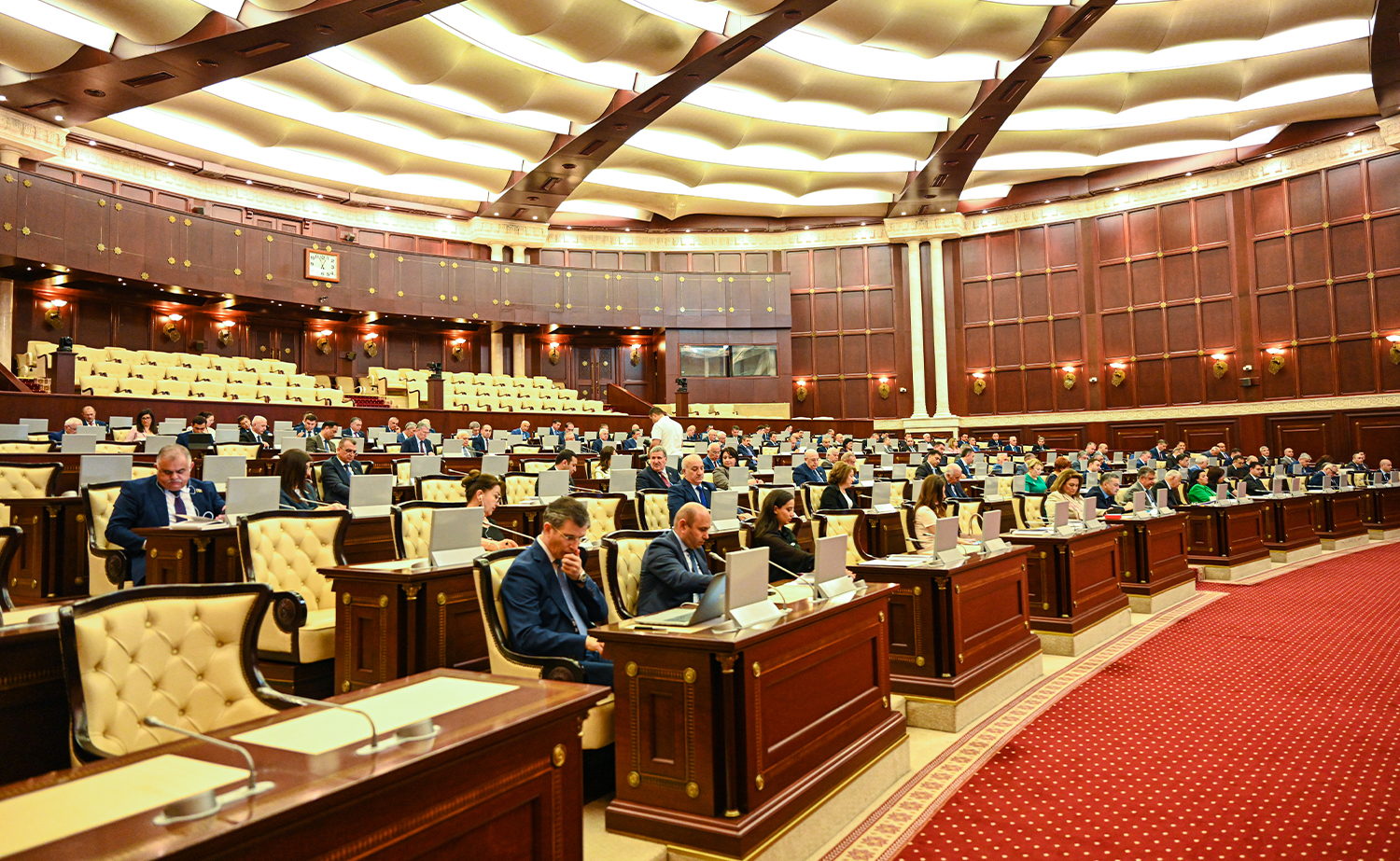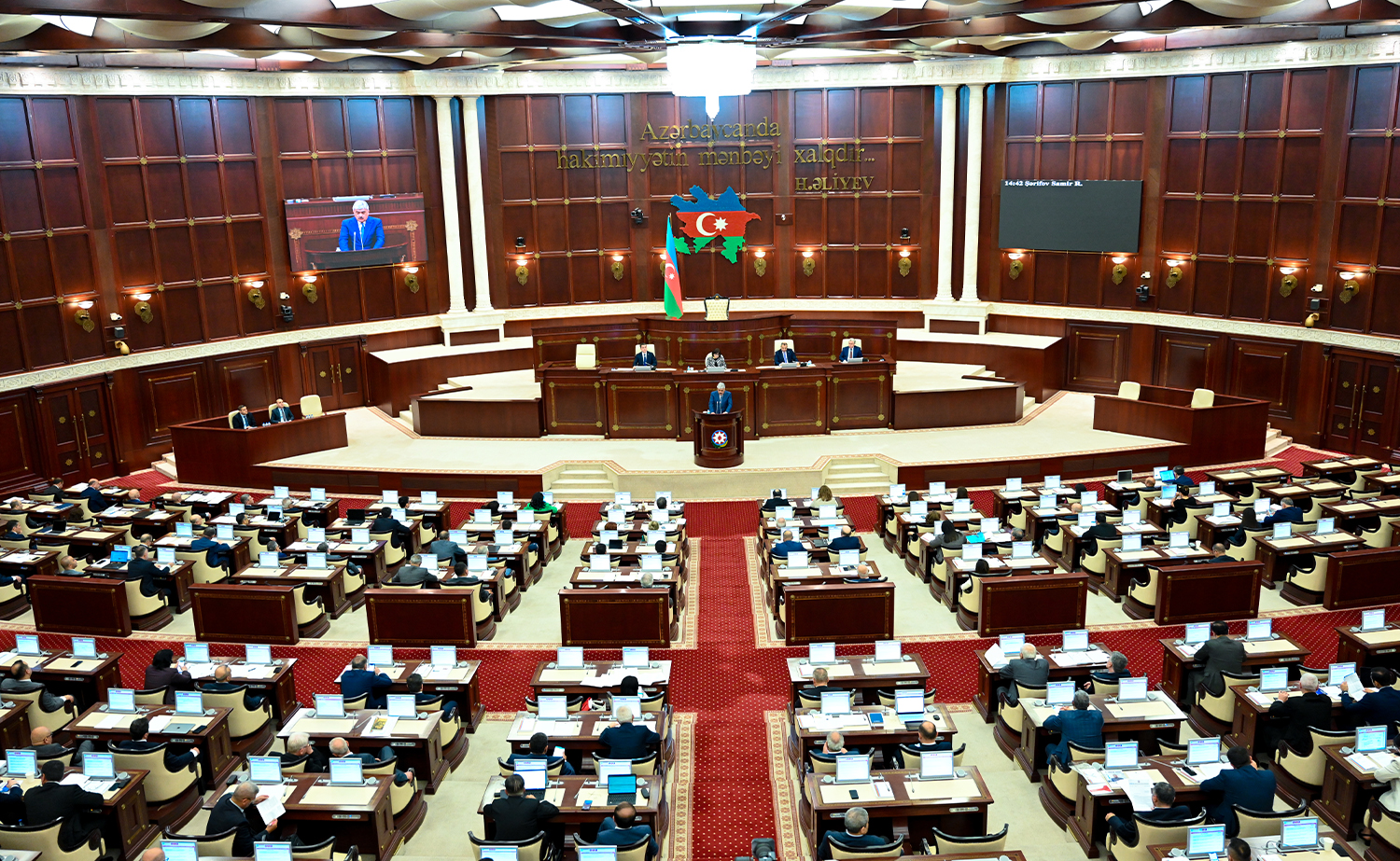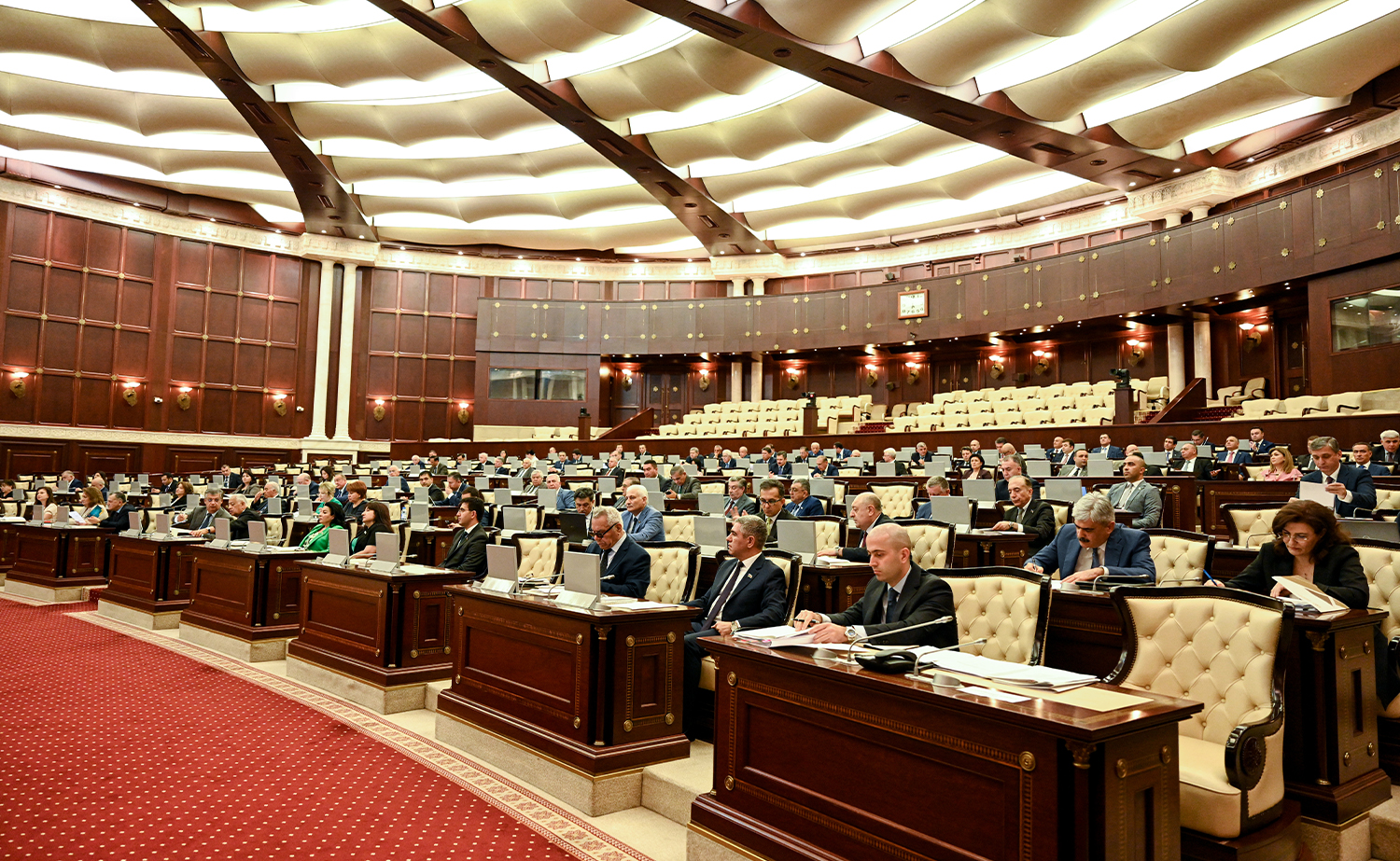At the Sitting of the Milli Majlis
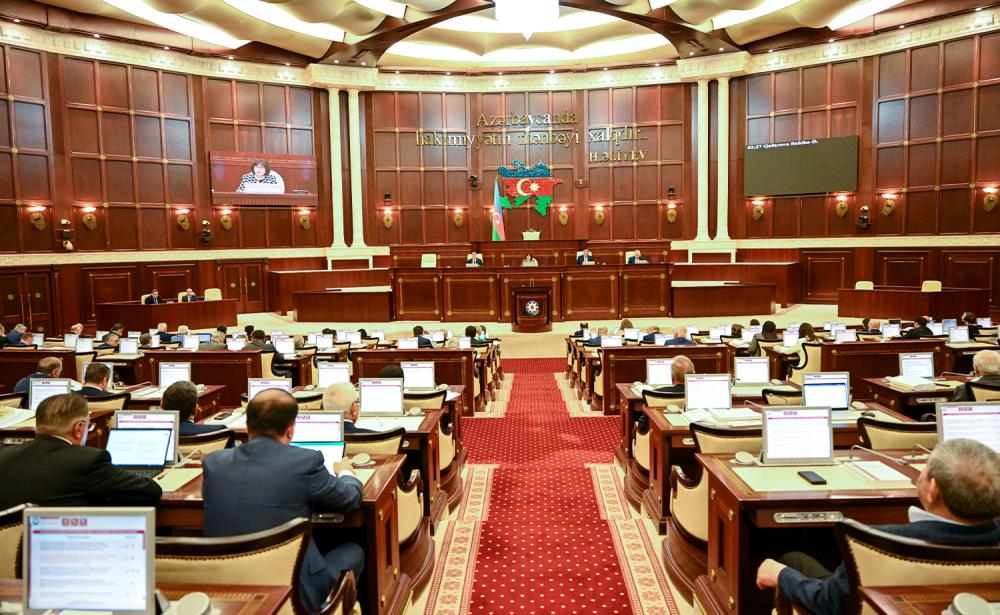
At the Sitting of the Milli Majlis
Another scheduled meeting in plenary in the extraordinary session of the Milli Majlis took place on 22 June.
Having declared the sitting open, Chair of the Milli Majlis Sahiba Gafarova began it by recounting the working trip of her delegation to Istanbul to take part in the Global Parliamentary Conference on 19-20 June.
This rather very influential gathering organised jointly by the Grand National Assembly of Turkey and the Inter-Parliamentary Union had been dedicated to the problems of migration and refugees amounting to one of the most pressing issues of the modern world. According to Mrs Gafarova, she had been key speaker at the first panel session. Her speech was about accepting and accommodating migrants and refugees, ensuring their effective social and economic integration as well as making certain they would return to home countries safely and with dignity eventually. Relying on her past experience as chair of the migration, refugees and IDP committee of the Parliamentary Assembly of the Council of Europe, Mrs Gafarova had said that the relevant global pacts emphasised the necessity of international co-operation in defence of migrant and refugee rights.
Mrs Gafarova had also told her audience of the pertaining Azerbaijani experience, having said that administration of migration processes in keeping with international standards and the national legislation alike as well as the defence of migrant rights made priorities within our national migration policy. It had been said that Azerbaijan was one of the first countries in the world to join both Global Compacts on Migration and Refugees and was the first in her region to establish UN Network on Migration at the national level.
Telling of Azerbaijan’s victory in the Patriotic War of 2020, the Chair of the Milli Majlis had said to the conference participants that the government had been taking all the steps to meet the needs of the almost 1 million refugees and IDP despite the heavy social and economic burden imposed on it by the occupation.
The liberation of the formerly-captured lands new realities and opportunities for peace and prosperity in the region as well as it ensured the right of the IDPs to return to their homeland; so, Azerbaijan is on the verge of dynamic internal migration processes. The restoration work going on in those provinces and the efforts made to reintegrate them with the national economy would make Garabagh and East Zangazur attractive in terms of tourism and investments, Mrs Gafarova had said at the conference.
Also during the same working trip to Istanbul, Sahiba Gafarova had had a conversation with Chair of the Grand National Assembly of Turkey Mustafa Şentop at which both mentioned with pleasure the progress of the Turkish-Azerbaijani relations resting on the two countries’ amity and fraternity. It was stressed that both Turkey and Azerbaijan took the identical grounds on all subjects, which was actually a manifestation of this fraternity and friendly bonds. The high-level relations between the leaders of our states and the benevolent impact those relations had on the uninterruptible advancement of our relations were mentioned, too; other matters of interest to both sides were also mentioned at that meeting.
Mrs Gafarova concluded her account of that visit and thanked the leader of the Milli Majlis working group for the Azerbaijan-Turkey inter-parliamentary connexions Ahliman Amiraslanov and the other members of the delegation that had visited Istanbul with her.
The House moved on to the issues du jour then.
The agenda consisted of 20 items, Sahiba Gafarova announced. The current global economic developments and the trends in the Azerbaijani economy brought about by them, including the macro-economic indications of the five months past, had necessitated certain modifications in the current-year state budget law and in the two other laws included in the budgetary parcel. Therefore, the Head of State had resorted to his legislative initiative and had submitted to the Milli Majlis the relevant Bills that made the first three items on the agenda, Mrs Gafarova continued. Each of those would be considered in the first reading, Mrs Gafarova remarked, greeting then the attending representatives of the concerned state departments and suggesting that the three presentations be heard separately whilst the Bills be reviewed together given all the three are related to the Budgetary Parcel.
The chairman of the Economic Policy, Industries and Enterprising Committee Tahir Mirkishili gave an overview of the amendments to the Law on the 2022 State Budget of the Azerbaijan Republic. He told the Assembly that the urgent measures to increase the national defence capacity and security, to reclaim the de-occupied territories, to ensure social protection and to maintain food security had brought about additional state financial demands. It is the need to meet those with the extra revenues and the reserves of the State Budget that necessitates the latter’s revision.
When the 2022 State Budget Law was passed, its revenues, expenditures and deficit were set at AZN 26 bn 816 mn, AZN 29 bn 879 mn and AZN 3 bn 63 mn respectively. At the same time, the real GDP growth rate, the average annual inflation, the average monthly salary growth rate and the price per 1 bbl of crude oil were forecast to equal, in that order, 3.9%, 4%, 8.7% and USD 50.
The national economy demonstrated substantial increases in all the sectors during M522 as a consequence of the economic and geo-economic policies pursued under the guidance of President Ilham Aliyev of Azerbaijan. There was a considerable rise in the export FX earnings; the five months’ GDP and its non-oil component climbed by 7.2% and 11% to AZN 50.8 bn and over AZN 25 bn, respectively. The non-oil exports of the said period’s four months had risen by 38.5%, Mr Mirkishili continued. The FX returns on gas export sales had approached the counterpart received on crude oil export sales in Q122, which was happening for the first time ever. Namely, the committee chairman detailed, the oil and gas export revenues of the period had amounted to USD 3.8 bn and USD 3.5 bn demonstrating the biggest growth in the twelve years past. At the same time, the average monthly salary rose by 14.2% and the average annual inflation made 12.6% in that period, during which, besides, the price per 1 bbl of the Azeri Light equalled USD 106.
The M522 real-time updates on the state and consolidated budgets indicate that the revenues of the five months exceeded the period forecast by AZN 1.2 bn or 10.8% whereas the expenditures were AZN 70 mn or 0.7% up on the five-month projection. That resulted in the state budget surplus that equalled AZN 1 bn 992.4 mn and was 2.4 times as much as the corresponding forecast. All those figures give sound grounds for the aforementioned amendments to the 2022 State Budget, then.
According to Tahir Mirkishili, the Bill envisages the corresponding increases in the Budget’s revenues and expenditures by AZN 2 bn 381 mn and AZN 2 bn 424 mn. The Bill will provide for panoplied encounters with this year’s forthcoming challenges; at the same time, there will be a solid foundation for the implementation of the state policy in every field it encompasses.
Mr Mirkishili was followed by Minister of Finance Samir Sharifov who said that President Ilham Aliyev had instructed while in Zanghilan Province on 27 May this year that a portion of the State Budget revenues in excess of the forecasts should be released towards the costs of the liberated provinces’ on-going restoration. That was done with a view to the positive economic dynamics and the fact that the revenues of both the state and the consolidated budgets had been overlapping the pertaining projections. Concurrently, President Aliyev had commanded to increase the spending on defensive potential and security, accumulation of additional food security reserves, the continued finance of road-building and educational infrastructure projects, supporting business enterprises and meeting other needs.
The national economic growth and the state budget performance data for M522 are really rather impressing. The period’s GDP reached AZN 50.9 bn (the non-oil GDP making AZN 25 bn) with the excess, in real terms, of the GDP of the corresponding period of last year by 7.2% (+11% in the non-oil sector). The State Budget’s revenues, too, showed a sizeable increase: the plan was done to AZN 12 bn 442 mn or 110.8% with an increase by AZN 2 bn 707 mn or 27.8% from the figure reported for the matching period of last year. The total included AZN 6 bn 353 mn from the non-oil sector being AZN 1 bn 592 mn or 33.4% up on M521. The fiscal offices over-performed their five-month plans as well: the State Tax Service’s collections from the non-oil sector overlapped the period plan by AZN 895 mn or 29.9% whilst the State Customs Committee turned in AZN 344 mn or 20% more than what had been forecast.
There were considerable changes in the consolidated budget also, what with its M522 revenues having been AZN 3 bn 27 mn or 24.2% up on January-May 2021. It had been forecast that there would be a M522 deficit equalling AZN 2 bn 179 mn but that period actually showed a surplus in the amount of AZN 3 bn 900 mn.
The revision of the budgetary parameters will generate the AZN 2 bn 986 mn that it is planned to use to finance several priority tasks, such as building the road & transport infrastructure in the de-occupied lands and improvement of the existing infrastructure in the other parts of the country, rebuilding and building anew residential and non-residential estates and sites in the provinces afflicted during the Patriotic War, increasing the national defensive capacity and military prowess, maintaining national security, maintaining also social protection c/w finance of the benefits on retirement pensions and social benefits, ensuring food security, promotion of business enterprising and so forth.
The revision suggests the revenues at AZN 32 bn 304 mn, which would be AZN 2 bn 425 mn or 8.1% more than the plan affirmed originally. The current, capital and state-debt servicing costs are expected to make, respectively, 62.7% of the aggregate amount or AZN 20 bn 247 mn, 31.8% or AZN 10 bn 265 mn and 5.5% or AZN 1 bn 792 mn.
As regards the reviewed consolidated budget’s revenues and expenses, they are forecast in the respective sums of AZN 36 bn 661 mn and AZN 35 bn 541 mn, which means they are to be AZN 8 bn 976 mn or 32.4% and AZN 2 bn 627 mn or 8% higher than the initial forecasts suggested. When the 2022 consolidated budget was passed, a deficit equalling AZN 5 bn 229 mn was set for it; meanwhile, the additional revenues that equal AZN 6 bn 349 mn are expected to bring about a surplus in the amount of AZN 1 bn 120 mn. The revenue and expenditure articles of the State Oil Fund as included in the consolidated budget will be AZN 15 bn 789 mn and AZN 11 bn 563 mn respectively.
The revenues and expenditures within the budget of the State Social Protection Fund will be identical and will equal AZN 5 bn 606 mn, which forecast suggests an increase by AZN 300 mn or 5.6% from the previously-passed analogues. As for the Unemployment Insurance Fund, its, again, identical revenues and expenditures, forecast to equal AZN 181 mn are AZN 1 mn or 0.6% greater than the original estimations. The 2022 budget of the Nakhchivan Autonomous Republic is going from the respective previous levels AZN 28.5 mn or 4.9% up to AZN 606 mn while the governmental grant is being raised by AZN 26 mn or 6%.
It was said that the presented changes were completely in line with the budgeting rule as specified in the Budgetary System Law as well as with the ceilings set by the President of the country, in accordance with that rule, for non-petroleum deficit and state debt as targeted in the consolidated budget of 2022.
Capping his presentation, the Minister said that the main goal pursued in reviewing and revising the 2022 state and consolidated budgets was that of creating additional finances to fund (which is possible to do thanks to the growing financial potential and national revenues) those priority state tasks and goals that are on the agenda for national development and have been defined by the Head of State.
The plenum continued.
The head of the parliamentary Labour and Social Policy Committee Musa Guliyev placed before the House draft amendments to the 2022 Budget of the State Social Protection Fund with the intended increments of its revenue and spending items by AZN 299.5 mn or 5.6% to AZN 5 bn 606 mn 300 thousand with reliance upon these two sources: the collection of the compulsory state social insurance fees and the funds to be released from the State Budget. As regards the planned expenses, they will rise in the main due to the forecast increase in the population payments. Besides, it is planned to fund the work of the DOST Service, to cover banking fees and to pay for other required services.
Musa Guliyev also tabled amendments to the 2022 Budget of the Unemployment Insurance Fund, saying that the sum of unemployment insurance fees receivable from the government-funded organisations had been reduced from AZN 21,709,238.0 by AZN 1,088,138.0 to AZN 20,621,100.0. Accordingly, the unemployment insurance requirement criterion set for such organisations slides by AZN 1,088,138.0 – from AZN 21,709,238.0 to AZN 20,621,100.0. Consequently, the aggregate forecast collection in this class is raised from AZN 136,418,476.0 by AZN 6,923,724.0 to AZN 143,342,200.0. Further, it is proposed, in view of such changes, that the 2022 revenues and expenses of the UIF should be raised by AZN 1,000,000.0, to wit, from AZN 180,375,536.0 to AZN 181,375,536.0.
Tahir Mirkishili offered the opinion statement of his Economic Policy, Industries and Enterprising Committee on the amendments to the 2022 Budget of the UIF.
The chairman of the Chamber of Accounts Vugar Gulmammadov then placed before the House the Chamber’s opinion statement concerning the draft amendments to the current-year budgets of both the SSPF and the UIF. Mr Gulmammadov referred to the macro-economic forecasts forming the reviewed State Budget’s parameters; he laid down a study of the principal economic trends in the world and in Azerbaijan. The reviewed State Budget of the current year meets the requirements of the Budgetary System Law and follows the budgeting rule, according to Mr Gulmammadov who proceeded to inform the Milli Majlis of fiscal risks.
The document drawn up and submitted together with the 2022 State Budget Bill indicates as the staple risks the COVID-19 pandemic, a fall in crude oil prices and a decline in the upstream volumes as well as those risks that are rooted in the state-guaranteed debts and expansive subsidising.
Mr Gulmammadov also put forth his opinion about the proposed changes in the annual budgets of both Funds.
As the drafts were debated, the Bills were supported by the committee chairs Sadig Gurbanov, Hijran Huseynova, Zahid Oruj and Siyavush Novruzov. There were also affirmative remarks by the MPs Ramin Mammadov, Rashad Mahmudov, Aghiya Nakhchivanli, Vugar Bayramov, Elshan Musayev, Tahir Karimli and Fazil Mustafa. The orators shared their views and made a number of remarks, too.
In the end, all the three Bills were voted through the first reading one by one.
Then came the turn of the next 6 items on the agenda, which were the Bills in the third reading.
The chairman of the Economic Policy, Industries and Enterprising Committee Tahir Mirkishili told about the trip of the committee members to the Alyat Free Economic Zone as he was placing amendments to the Alyat FEZ Law before the Milli Majlis.
He said that the visitors had found out about the work done in the FEZ, about what had been planned to do and what arrangements were in place there.
Speaking of the draft, it pursues the goal of optimising the FEZ workings and streamlining the relevant legislation in conformity with the relevant international experience. It is proposed to adjust the FEZ operating body’s authorities, rights and obligations; the same would be done to the tax and customs regulation within the FEZ, protection of investors’ rights and a dispute resolution mechanism.
The Bill was passed in the third reading.
Tahir Mirkishili also tabled the Investment Activities Bill, which, he told the House, would define the legal and economic basics of investment practice in the Azerbaijan Republic and would also ensure protection of investors’ rights and lawful interests. The document contains the goals and main target areas of the state policy concerning investment operations; there are also the state regulation principles, stimulation, and the investment priorities and forms. Also, there are the articles encompassing investors’ rights and obligations, the relevant state guarantees and other matters.
The House voted the Bill through the third reading.
First Deputy Chair of the Milli Majlis/chairman of the Law Policy and State-Building Committee tabled draft amendments to the Code of Administrative Procedure, the Code of Administrative Offences, the Criminal Code and the Law ‘On Citizens’ Applications’. The amendments would unify those codes and the law with the already-effective Law ‘On the Rules of Employment of the Legislative Initiative by the Citizens of the Azerbaijan Republic’, Mr Huseynli explained.
This Bill was passed in the third reading, too.
Chair of the Milli Majlis Sahiba Gafarova said then that the three agenda items coming up next had arrived at the Parliament in one parcel submitted by the President. Those Bills are close substantively. The amendments contained in all the three ensue from the Human Organs and Tissues Donations and Transplantation Law, Mrs Gafarova specified.
Nizami Safarov of the Law Policy and State-Building Committee described the separate sets of amendments to the Criminal Code and the Code of Administrative Offences, saying that they would define penalties for violation of the already-mentioned Human Organs and Tissues Donations and Transplantation Law.
A favourable resume of the Health Committee was presented by its chairman Ahliman Amiraslanov.
It was said regarding the next item on the agenda that those amendments to the laws ‘On Protection of the Population Health’, ‘On the List of Items Not Subject to Civil Circulation (excluded from the civil circulation)’, ‘On the Range of Items that Can be Owned by Certain Civil Circulation Participants and are Cleared for the Circulation on Special Permits (with their effects limited to civil circulation’, ‘On Combatting Trade in Humans’ and ‘On Advertising’ were of the harmonising nature.
Then the relevant favourable opinion statements of the Human Rights Committee, the Economic Policy, Industries and Enterprising Committee and the Health Committee were made known then.
Ultimately, the Bills were voted through the second reading one after another, whereafter the sitting turned to the three documents placed before it in the second reading.
First, Nizami Safarov of the Law Policy and State-Building Committee brought forth draft amendments to the Civil and Migration codes and to the laws ‘On Fire Safety’, ‘On Mineral Resources’, ‘On Fishing and Fisheries’, ‘On Technical Safety’, ‘On the Protection of the Atmospheric Air’, ‘On Tobacco and Tobacco Products’, ‘On Telecommunication’, ‘On Pedigree Animal-Breeding’, ‘On Natural Health Resources, Treatment Facilities and Resorts’, ‘On Cotton-Growing’ and ‘On the Protection of the Intellectual Property Rights and Anti-Piracy’.
MP Safarov said that the document had been drawn up in the context of the Law ‘On Regulation of Business Enterprise Checks and Protection of Enterprisers’ Interests’, and was intended to harmonise the aforementioned laws and codes with that law.
The relevant opinion statements of the parliamentary committees were offered by Ziyafet Asgarov (Defence, Security and Counter-Corruption), Sadig Gurbanov (Natural Resources, Energy and Ecology), Tahir Mirkishili (Economic Policy, Industries and Enterprising), Musa Guliyev (Labour and Social Policy), Tahir Rzayev (Agrarian Policy) and Fazil Mustafa (Culture).
Then, the Bill was adopted in the second reading.
The deputy chair of the Labour and Social Policy Committee Malahat Ibrahimghizi placed before the House amendments to the Law ‘On the Individual Accounting in the State Social Insurance System’, prepared, she said, to optimise regulation of the personal accounting of data legally required to protect insured persons’ lawful rights to social protection. Since the right of the expatriates and apatrides permanently resident in Azerbaijan to retirement pensions and other social benefits on par with the Azerbaijani citizens and on the identical legislative conditions is stipulated in the Bill, it is therefore proposed to apply the future law to those two categories as well. It is further proposed to take into account all the periods of an insurant that are included in his/her social insurance record and to do the same when retirement pensions are afforded in case of the loss (decease) of the bread-winner. The Bill contains several other adjustments, too, according to Mrs Ibrahimghizi.
The Bill was voted through the second reading.
The chairman of the Economic Policy, Industries and Enterprising Committee Tahir Mirkishili proceeded to inform the Assembly about amendments to the Movable Property Encumbrance Law. He said that the separate amendments to the Social Insurance Law and the Tax Code (both dated 30 November 2018) charged the tax authorities to calculate, levy and collect the compulsory state social insurance fees and to control operations in this field. Besides, the same authorities were empowered to determine the pertaining arrears as well as to calculate and levy interest fees and financial penalties for untimely settlement of such arrears. As regards the amendments, then, they follow the said legal acts (the law and the code) and are of unifying nature.
The Bill was voted through the second reading.
Bills in the first reading were brought up at the plenum subsequently.
The chairman of the Economic Policy, Industries and Enterprising Committee Tahir Mirkishili brought to the attention of the House amendments to the Tax Code, saying that they were intended to regulate taxation of legal entities providing private veterinary services as well as of individuals acting as private veterinaries. It is suggested that private veterinary clinics should be exempted from the VAT and that individual veterinaries should be put on record as the simplified tax payers.
That Bill was passed, too – in the first reading.
Nizami Safarov of the Law Policy and State-Building Committee put before the House amendments to the State Orders and Medals Law in connexion with the institution of the jubilee medal ‘The 20th Anniversary (2002-2022) of the Human Rights Commissioner (Ombudsman) of the Azerbaijan Republic’. The Bill comes from the President. The charter of the new medal indicates that the decoration will be bestowed on those active in making protection of human rights and liberties more effective and efficient as well as those organising and carrying into life efficient co-operation in this area in the Azerbaijan Republic. Further still, the new medal may be awarded, for outstanding merits and services, to officials of Azerbaijani state departments and other offices as well as those of other countries – and representatives of international organisations.
The Bill was passed in the first reading following its description by MP Safarov.
Chair of the Milli Majlis Sahiba Gafarova announced that the next 6 items on the agenda had been submitted by the President in one parcel and were essentially close to each other.
Those drafts were tabled by First Deputy Chair of the Milli Majlis/chairman of the Law Policy and State-Building Committee Ali Huseynli. His conceptual presentation encompassed the stand-alone amendments to the Constitutional Law ‘On the Human Rights Commissioner (Ombudsman) of the Azerbaijan Republic), to the Constitutional Court Law, to the Courts and Judges Law and to the Law ‘On the Status of the Member of the Milli Majlis of the Azerbaijan Republic’.
It was mentioned during the overview that the Azerbaijan Republic had a Civil Service development strategy for the years 2019-2025 that envisages, amongst other things, optimisation of the Services’ remuneration system. Namely, the implementation of the said strategy had optimised the remuneration system in use by the executive authority bodies (with the job salaries of the civil servants increased duly) at the beginning of this year. Now, then, it is proposed to shift to the same system that the executive authority bodies use also the staffs of the judicial and legislative branches and of the office of the Human Rights Commissioner. The amendments contain the similar mechanisms for both branches; to wit, they introduce salary mark-ups while terminating allowances. At the same time, they would liquidate the current binding with the salaries paid in the authorities: the salaries paid within the said branches would be determined independently. The Bills would ensure the introduction of a universal remuneration system across the state authorities, Mr Huseynli summed up before lauding this particular initiative of the Head of State.
The head of the Economic Policy, Industries and Enterprising Committee Tahir Mirkishili tabled amendments to the Chamber of Accounts Law. He talked about the pressing need to keep remuneration systems transparent and steady, and said that the amendments at hand would be to the remuneration system for the staff of the Chamber of Accounts.
Tahir Mirkishili told the House about this amendment to the Tax Code: in Article 102.1.17, the wording ‘The monthly monetary allowance afforded to the Members of the Milli Majlis of the Azerbaijan Republic in sums as legally prescribed and in coverage of their office discharge costs, and the corresponding…’ is to be replaced with just one word ‘corresponding’. The purpose of this amendment is to align the said article with the changes in the Law ‘On the Status of the Members of the Milli Majlis of the Azerbaijan Republic’.
The last six Bills of the day were voted through the first reading one by one and with that today’s plenary meeting of the Milli Majlis was over.
The Press and Public Relations Department
The Milli Majlis



